#imperial russian court dresses
Explore tagged Tumblr posts
Text
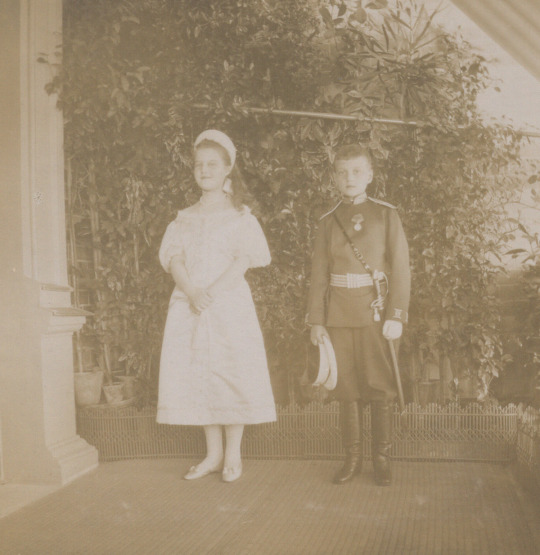
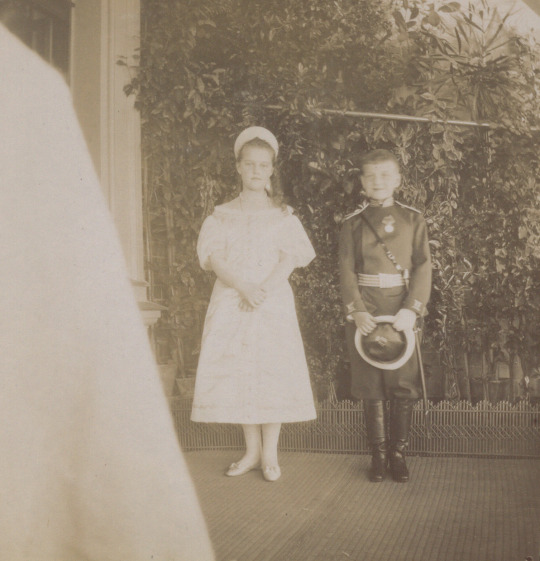
Grand Duchess Maria Pavlovna (the younger) with her brother Grand Duke Dmitri Pavlovich at Grand Duchess Anastasia Nikolaevna’s baptism, 1901
#they are so cute!#maria pavlovna the younger#maria pavlovna#dmitri pavlovich#anastasia nikolaevna#baptism#1901#imperial russia#imperial Russian court dresses#kokoshnik#grand Duke Dmitri Pavlovich#grand duchess Maria Pavlovna#romanov family
68 notes
·
View notes
Photo









Ceremonial court dresses belonging to Grand Duchess Olga Nikolaevna and Grand Duchess Tatiana Nikolaevna. Satin, tulle, velvet, artificial flowers, lace, imitation pearl; embroidery. Atelier of Olga Bulbenkova, St. Petersburg. 1913
#olga nikolaevna#tatiana nikolaevna#russian court dress#imperial russian court dresses#kokoshnik#1913#1913 official portraits
34 notes
·
View notes
Text
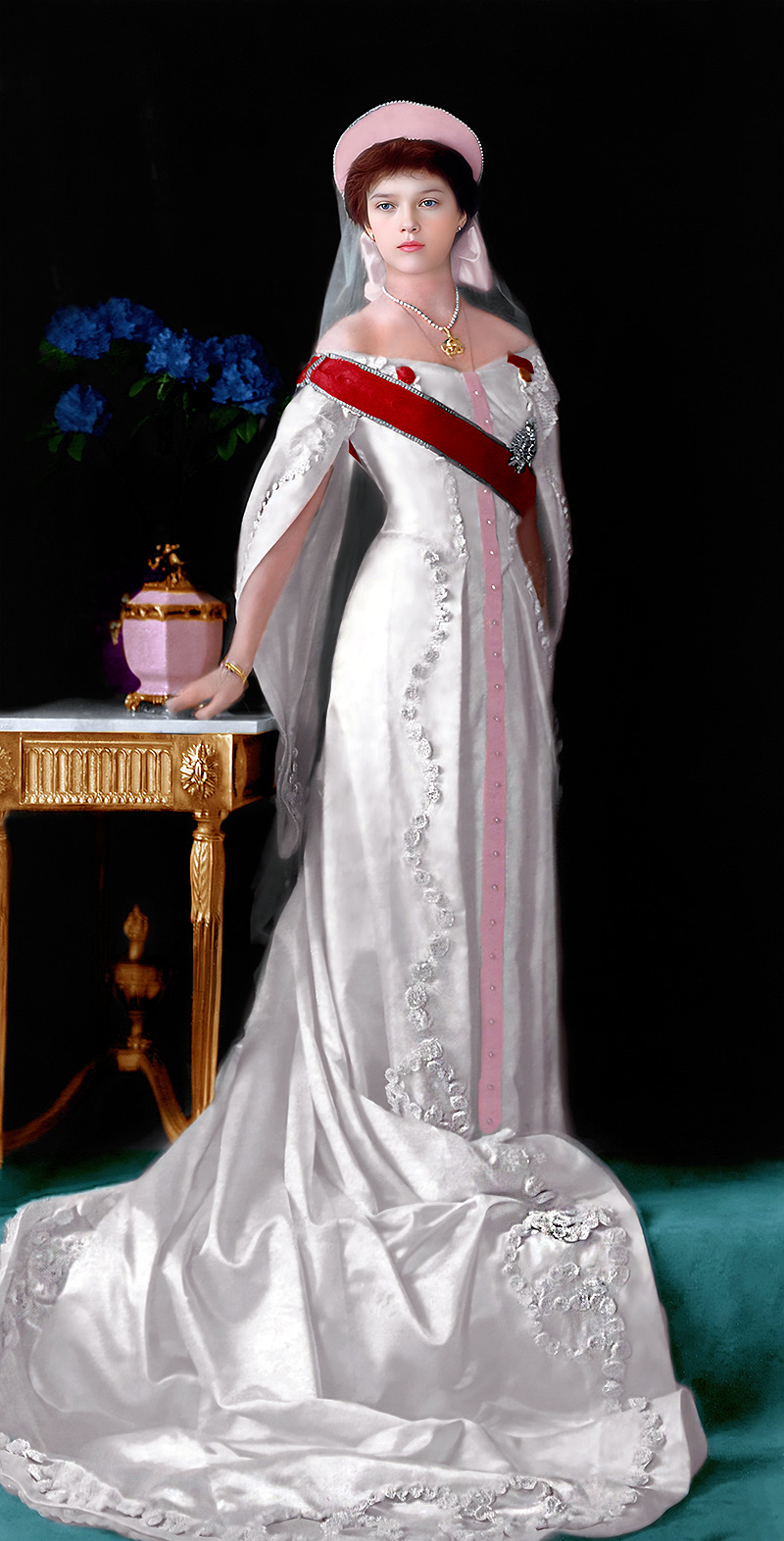
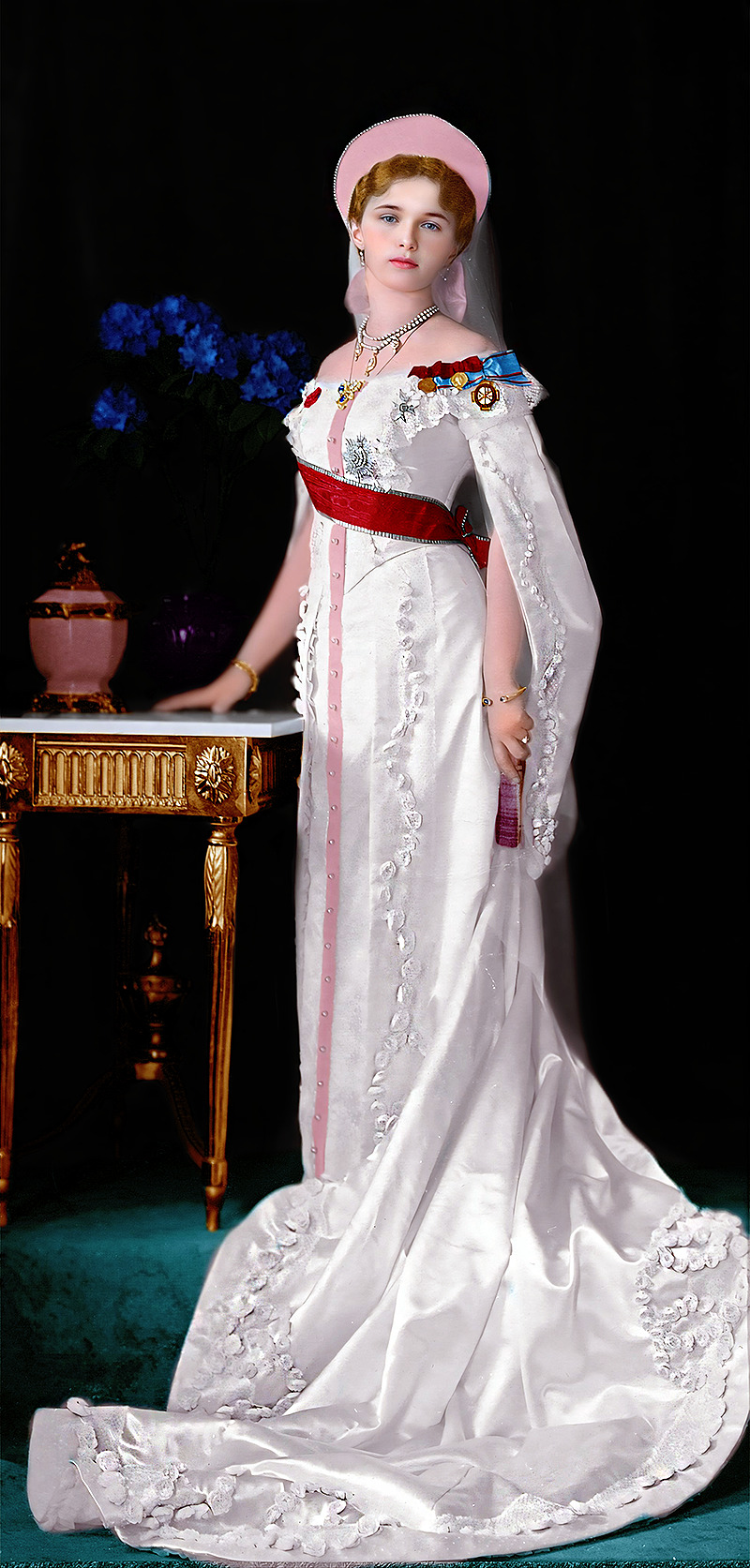
Grand Duchess Tatiana Nicholaievna of Russia and her elder sister Grand Duchess Olga Nicholaievna of Russia, 1913.
#Grand Duchess Tatiana Nicholaievna of Russia#Grand Duchess Tatiana Nicholaievna#Grand Duchess Tatiana of Russia#Grand Duchess Olga Nicholaievna of Russia#Grand Duchess Olga Nicholaievna#Grand Duchess Olga of Russia#The BIg Pair#OTMA#Romanovs#imperial family#russian imperial family#imperial russia#colored photography#1910s#1913#russian court dress#romanov tercentenary#history colored
104 notes
·
View notes
Text
Olga and Tatiana's Journey Through Court Dresses
1904



1911




1913








#romanovs#history#imperial russia#historical photos#romanov#romanov family#olga nikolaevna#tatiana nikolaevna#russian royalty#russian imperial family#romanov sisters#the big pair#historical photo#historical fashion#court dress#1904#1911#1913#1900s#early 1900s#1910s#1900s fashion#1910s fashion
25 notes
·
View notes
Text
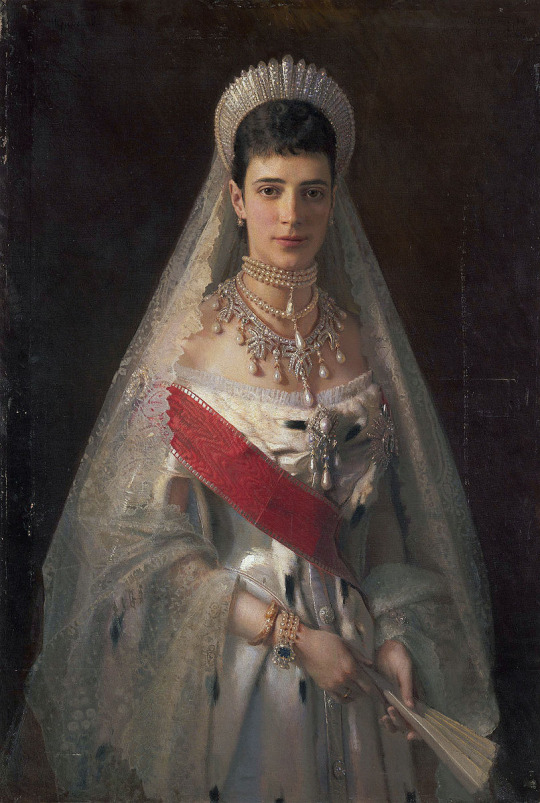
Portrait of Empress Maria Feodorovna, Ivan Kramskoj. 1881.
#aesthetic#art#art history#victorian aesthetic#fashion#victorian#gilded age#historical fashion#russian royals#danish royalty#imperial russian fashion#russian court dress#Russian fashion#Romanovs#historical art#maria feodorovna#dagmar of denmark#imperial Russia#Russian art#Russian history#russian imperial family#Romanov family#tsarina#tsarina Maria Feodorovna#women in art#historic fashion#kokoshnik tiara#kokoshnik
83 notes
·
View notes
Text
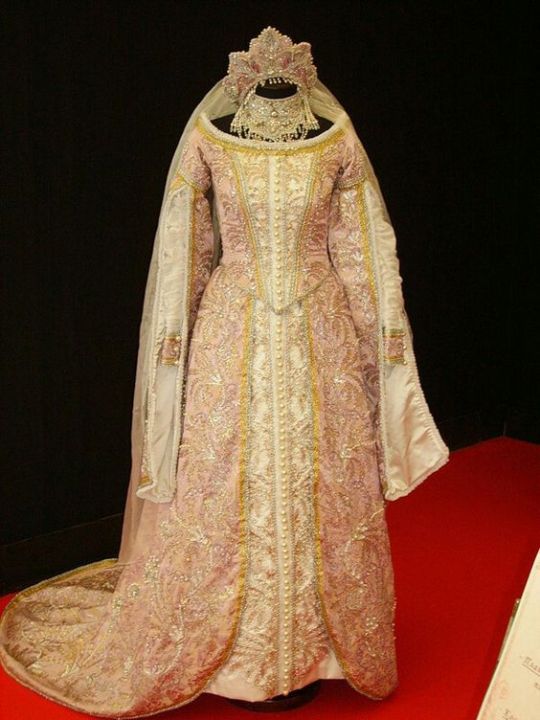
link
formal court ensemble for Rhaena
#hotd#rhaena of pentos#Rhaena hightower#or a wedding ensemble to Aemond#I really like Imperial Russian for Targaryen court dress#me giving Rhaena the wardrobe she deserves
9 notes
·
View notes
Text
What I find odd about these kind of images is how often the artists color the kokoshniki as blue, when of course in reality they were pink. Perhaps blue was a common color for kokoshniki.

Romanov Imperial children
Russian vintage postcard
#romanovs#imperial russia#history#romanov family#olga nikolaevna#romanov#anastasia nikolaevna#tatiana nikolaevna#maria nikolaevna#anastasia romanov#alexei nikolaevich#1910#vintage postcards#vintage fashion#kokoshnik#court dress#otmaa#russian imperial family#russian royalty#otma#romanov sisters
22 notes
·
View notes
Text

Lannister Bride | Sansa Stark
Bridal outfit heavily inspired by late 19th-early 20th century Imperial Russian court dress.
“…the gown itself was ivory samite and cloth-of-silver, and lined with silvery satin. The points of the long dagged sleeves almost touched the ground when she lowered her arms. And it was a woman’s gown, not a little girl’s, there was no doubt of that. The bodice was slashed in front almost to her belly, the deep vee covered over in ornate Myrish lace in dove-grey. The skirts were long and full, the waist so tight that Sansa had to hold her breath as they laced her into it.”
292 notes
·
View notes
Photo
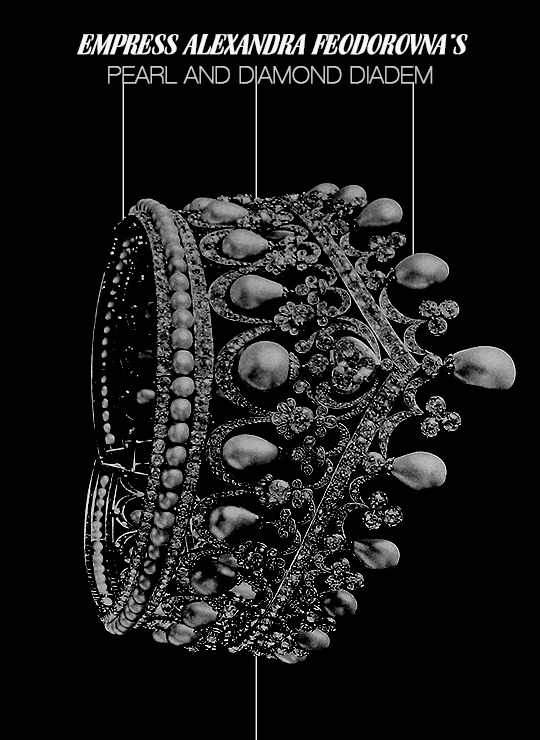

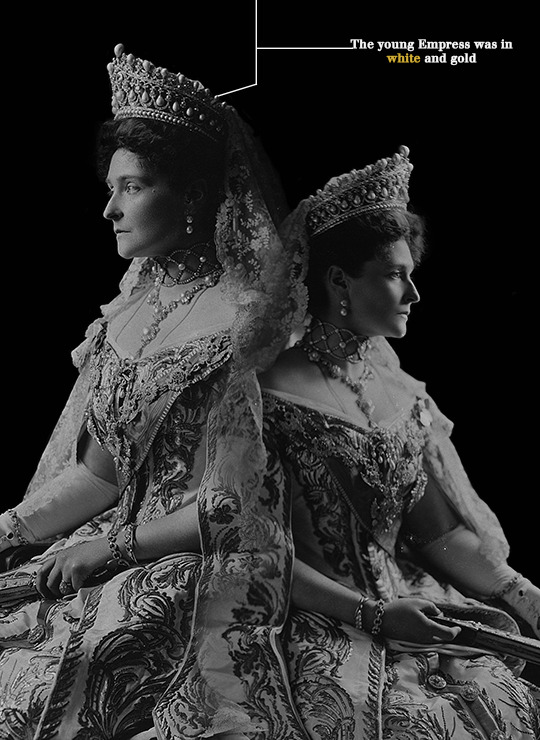
At the Russian Court (3/?) I M P E R I A L D I A D E M
‘Regal assemblage of pearls and old diamonds. This diadem is, past question, one of the finest specimens of its kind.’ Fersman
This splendid diadem, worn by the Empress Alexandra at the opening of the Duma, was catalogued by Fersman as early 19th century, but it is more likely to have been made by the court jeweller Bolin expressly for the Tsarina, using antique pearls and diamonds from the Imperial Cabinet. Fersman considered it to be the fiest piece in the entire imperial collection. All trace if of it is lost after the inventory of 1922, and it seems likely that as with other pieces from the collection it was sold or broken up when some of the imperial jewels were sold by Christie’s in London in 1927.
The Empress Alexandra in court dress for the opening of the first Duma in 1906, photographed by K. Bulla. She wears the diadem, a small diamond chain of the Order of St Andrew, and a collier de chien in pearls and diamonds and a pearl and diamond cluster necklace, both surely created by Bolin to accompany the diadem. Neither necklace appears among the inventoried jewels, and it is likely that they had been taken by the Empress to Tobolsk and then disappeared. | The Jewels of the Romanovs Family and Court by Stefano Papi
#historyedit#royaltyedit#empress alexandra feodorovna#romanov#jewelry#my edits#atrc#the big FUCK YU#of alexandra to the duma#lmao#civil liberties? liberalism?#i don't think so#fetch me by biggest diadem please#this piece of jewelry screams autocracy
491 notes
·
View notes
Text
I don't think these photos were taken as they watched the baptism, but as a celebration rather - similar to the 1913 tercentenary photos. I don't think Maria and Anastasia were at the baptism.
otmaa 1904



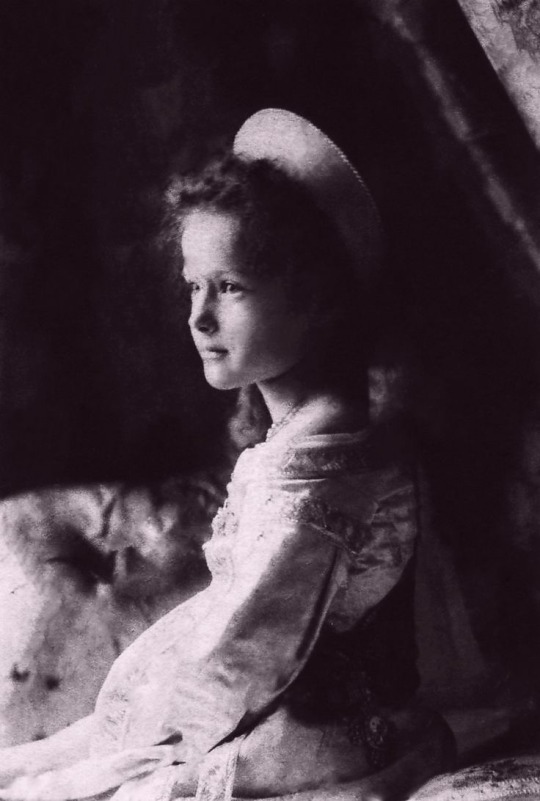



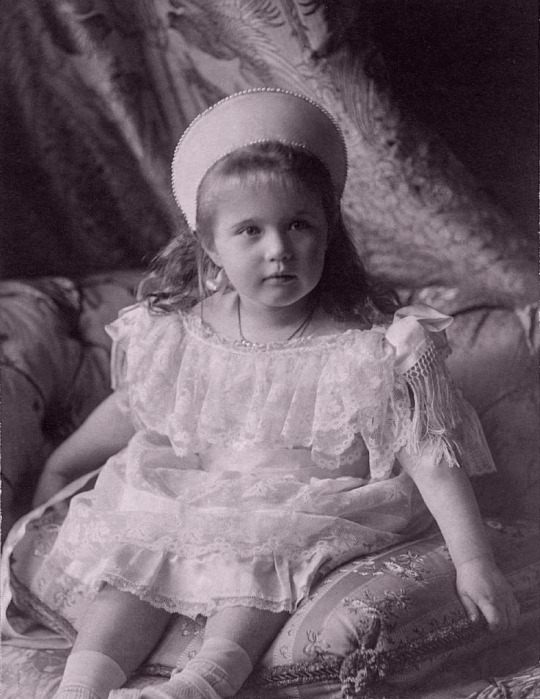


photo one: OTMAA, 1904. Olga is holding Alexei with a smile.
Photo two and three: Olga in two different angles as she watches her brothers baptism.
Photo four and five: Tatiana in two different angles as she watches her brothers baptism.
Photo six and seven: Maria in two different angles as she watches her brothers baptism.
Photo eight and nine: Anastasia in two different angles as she watches her brothers baptism.
Photo ten: A little baby Alexei in 1904, presumably around the time of his baptism.
#romanov family#romanov#romanovs#russian imperial family#russian royalty#olga nikolaevna#tatiana nikolaevna#maria nikolaevna#anastasia romanov#anastasia nikolaevna#1904#1900s#court dress#kokoshnik#1913#1910s#romanov sisters#alexei nikolaevich#otma#otmaa
20 notes
·
View notes
Text
Alexandra Feodorovna’s Wedding Dress
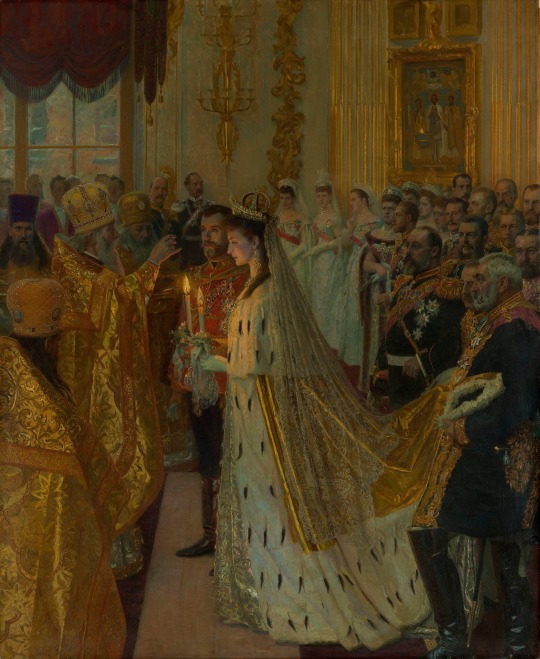
“Her wedding dress was a magnificent creation; the outfit was so intricate that it took nearly an hour for Alexandra to dress. Her stockings were of lace, her shoes embroidered and decorated. Over these she wore layers of stiff petticoats. The wide, full skirt of silver brocade opened from the waist down to reveal a second underskirt of silver tissue, edged with fur. The décolletage was cut low, to reveal the neck and shoulders, and the gown had short sleeves trailing ermine-edged tippets. The tightly fitted, boned bodice was sewn with diamonds which sparkled with every move. The folds of the overskirt fell back to form a train, and a separate, sweeping court train of cloth-of-gold edged with ermine fell from her shoulders. Over this, Alexandra wore the imperial mantle of cloth-of-gold, lined and edged with ermine. These robes were so heavy that four pages had to help carry them.
Alexandra wore her hair swept back to emphasise her graceful neck and shoulders. Two long, twin side curls were attached to her own hair. Her long veil of tulle was held in place by a Russian Kokoshnik tiara, of diamonds set in platinum, and the Romanov nuptial crown of diamonds sewn on crimson velvet. Alexandra also wore a number of diamond brooches on the front of her gown, along with the jewelled chain of the Order of St. Andrew and strings of pearls around her neck. These jewels, as well as the tiara, had been wedding gifts from the late tsar, costing some 300,000 rubles ($150,000). She also wore the imperial riviére, a diamond necklace of 475 carats, and a pair of matching earrings. The earrings were so heavy, in fact, that they had to be supported by wires around the ears, which slowly cut into the flesh as the day wore on. Around her tiara, Alexandra wore a wreath of orange blossoms, brought from the Imperial Conservatory in Warsaw. Across the dress stretched the red ribbon of the Order of St. Catherine.”
[Greg King, The Last Empress: The Life and Times of Alexandra Feodorovna, Tsarina of Russia]
169 notes
·
View notes
Text

Grand Duchesses Olga and Tatiana of Russia, 1913.
#imperial russia#imperial family#russian imperial family#romanovs#colored photography#1910s#otma#grand duchess olga nicholaievna of russia#grand duchess olga nicholaievna#grand duchess olga of russia#grand duchess tatiana nicholaievna of russia#grand duchess tatiana of russia#grand duchess tatiana nicholaievna#history colored#1913#russian court dress
28 notes
·
View notes
Text


The Empress Alexandra Feodorovna.
#romanovs#history#historical photos#imperial russia#romanov#romanov family#russian royalty#alexandra feodorovna#1895#1890s#court dress#kokoshnik#historical portrait#portrait#russian imperial family
5 notes
·
View notes
Note
@inky-duchess Thank you! So if I see a court gown in a color other than red or green it was definitely a Grand Duchess or other member of the royal family?
Hi I have a question about Imperial Russia If a noblewomen was invited to a formal court occasion, would she wear the full court dress even if she wasn't a member of the court? And could she pick the color of her gown or would she keep to the code of married =green, unmarried = red?
Yes, everybody who was invited to court had to adhere to the uniform and the rules of said uniform.
26 notes
·
View notes
Text




"Her wedding dress was a magnificent creation; the outfit was so intricate that it took nearly an hour for Alexandra to dress. Her stockings were of lace, her shoes embroidered and decorated. Over these she wore layers of stiff petticoats. The wide, full skirt of silver brocade opened from the waist down to reveal a second underskirt of silver tissue, edged with fur. The décolletage was cut low, to reveal the neck and shoulders, and the gown had short sleeves trailing ermine-edged tippets. The tightly fitted, boned bodice was sewn with diamonds which sparkled with every move. The folds of the overskirt fell back to form a train, and a separate, sweeping court train of cloth-of-gold edged with ermine fell from her shoulders. Over this, Alexandra wore the imperial mantle of cloth-of-gold, lined and edged with ermine. These robes were so heavy that four pages had to help carry them. Alexandra wore her hair swept back to emphasise her graceful neck and shoulders. Two long, twin side curls were attached to her own hair. Her long veil of tulle was held in place by a Russian Kokoshnik tiara, of diamonds set in platinum, and the Romanov nuptial crown of diamonds sewn on crimson velvet. Alexandra also wore a number of diamond brooches on the front of her gown, along with the jewelled chain of the Order of St. Andrew and strings of pearls around her neck. These jewels, as well as the tiara, had been wedding gifts from the late tsar, costing some 300,000 rubles ($150,000). She also wore the imperial riviére, a diamond necklace of 475 carats, and a pair of matching earrings. The earrings were so heavy, in fact, that they had to be supported by wires around the ears, which slowly cut into the flesh as the day wore on. Around her tiara, Alexandra wore a wreath of orange blossoms, brought from the Imperial Conservatory in Warsaw. Across the dress stretched the red ribbon of the Order of St. Catherine.”
The Last Empress: The Life and Times of Alexandra Feodorovna, Tsarina of Russia | Greg King
#facts#royal wedding#tsarina alexandra#alix of hesse#the last czars#my own#tsarina#romanovs#the romanovs
93 notes
·
View notes
Text



Green velvet court dress, ca. 1888, Russian.
By Charles Frederick Worth.
Indianapolis Museum of Art at Newfields.
#Indianapolis museum of art at Newfields#green#velvet#court dress#court attire#1880s#1888#1880s Russia#Russian#extant garments#womenswear#dress#silk#19th century#1880s dress#1880s court#1880s extant garment#charles frederick worth#house of worth
168 notes
·
View notes